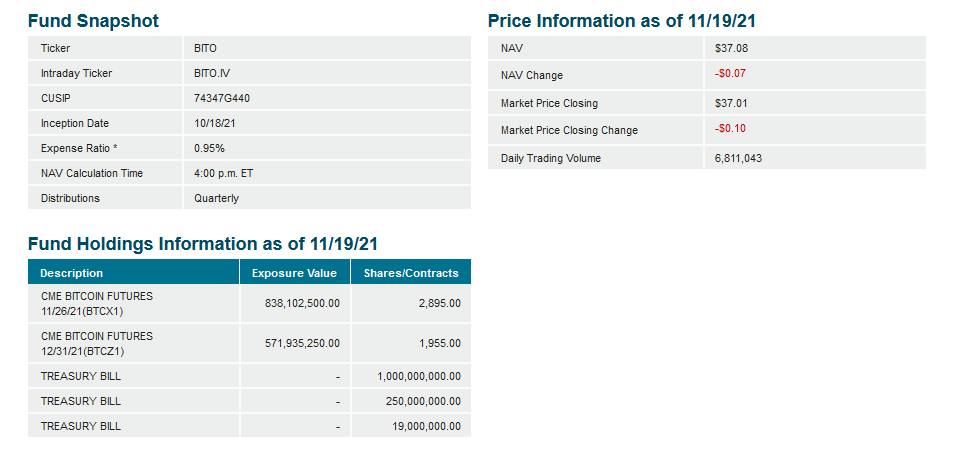A Great News for Bitcoin enthusiasts, Bitcoin officially hit the NYSE on Oct 19, 2021 with the introduction of a Bitcoin ETF BITO offered by Pro Shares. Another firm VanEck released Bitcoin Strategy ETF (XBTF) which began trading at CBOE Global Markets on Nov. 16, 2021 This is something that we’ve been waiting years for, and it’s finally come to fruition with trading that started on October 19.
We’re going to talk about what a Bitcoin ETF is and how it works. We’ll talk about why not just invest in Bitcoin in the first place?
So What is a Bitcoin ETF and How does it work?
I’ve talked about ETFs for months on this blog, and I’m a big fan of them. An ETF stands for exchange traded fund. It’s simply a basket of investments. These can be stocks or bonds that track the performance of a specific asset or group of assets.
So, for example, if you want an exposure to the entire United States stock market, you can invest in an ETF, such as Vanguard’s VTI.
VTI contains 4025 different stocks that track the performance of the US Total Market index, giving you a benchmark and diversification with incredibly low fees. ETFs are a much easier way to get exposure to certain asset classes without having to buy and sell individual assets or stocks in this example.
So a Bitcoin ETF is simply an ETF that tries to emulate the price of Bitcoin. This allows people to buy into the ETF without going through the process of actually buying the Bitcoin itself.
Since you’re buying the ETF, it’s kind of like buying a share of a stock. So by buying this share, this allows you to gain exposure to Bitcoin without having to worry about proper storage and safety procedures that come with owning Bitcoin responsibly.
So Let’s see how these Bitcoin ETFs work by giving a real world example, which is the Pro Shares Bitcoin strategy ETF .
This fund seeks to provide capital appreciation primarily through managed exposure to Bitcoin futures contracts. So why are these Bitcoin ETFs futures based?
These funds don’t hold actual Bitcoins instead, they will deal in Bitcoin futures, which are traded separately on US exchanges, such as the CME, which is the Chicago Mercantile Exchange.
For example, in my research, I found out that regulators prefer futures based ETFs because the SEC lacks jurisdiction over crypto trading in that regard.
The SEC has so far not approved any digital currency ETFs, even though, in my opinion they are inevitable.
So here are some quick stats on this ETF.
It’s ticker symbol is obviously B-I-T-O. It’s current price per unit is $37.08. And if you take a look at this screenshot, BITO looks to be finishing the day around one point $ 275 Billion in trading volume. This could take up a bit higher in afterhours trading, but that’s a massive number. You have to assume the fund is over $1 billion in assets under management and assume it’s likely holding multiple contracts.

So here’s the question that most Bitcoin maximalists are asking themselves, why wouldn’t you just buy Bitcoin in the first place? Why do you need an ETF? Let’s get into that right now. So why not just invest in Bitcoin in the first place?
Answer is BITO or XBTF is just like a gold ETF. You don’t own the physical gold bullion but you just hold some pieces of digital paper that give you a claim to a fund that has claims on the physical bullion.
XBTF is a cash settled fund which settles contracts in cash rather than the actual Bitcoin.
In my opinion, this defeats the entire purpose of a Gold or Bitcoin ETF in the first place. However, for the sake of being unbiased, I like to give all the reasoning out there.
So here are a few reasons that some may prefer a Bitcoin ETF:
- You don’t want the hassle. Some people don’t want the hassle of learning how to properly buy and store their Bitcoin. In my opinion, these people are used to intermediaries like banks holding their cash and similar assets. The point of holding your own Bitcoin is to be a sovereign individual and control the keys to your money or Bitcoin.
- Basically exchanges and KYC, you don’t want to deal with the exchanges. Exchanges are very similar to any other brokerage, especially with KYC aka know your customer laws. This means that you have to give up some proof of identity, verifying that this is indeed Joe Smith opening this account and buying this Bitcoin. A lot of Bitcoin is a very private individuals and they don’t want to be tracked via KYC laws.
So if you already have a brokerage set up that allows you to buy a Bitcoin ETF, you just may prefer to get your Bitcoin exposure that way through this.
Now If you want to keep it in a tax advantage account, you will eventually be able to put assets such as these in a tax advantage account. People will have questions , I won’t have to pay capital gains tax if I buy ETF. Although this may be true, but again, you’re just owning a futures contract at this point and not the actual asset itself.
Again, this is very similar to a gold ETF. If you’re okay with this, then this is perfectly fine strategy.
Frankly, I prefer to hold the actual Bitcoin itself. I also own physical gold, physical silver, that sort of thing. I don’t prefer the Bitcoin ETFs. At this point you are only buying a futures contract not original Bitcoin.
It makes more sense to just basically learn how to buy and hold Bitcoin itself.
There’s nothing wrong with ETFs. It also gives you the ability to sort them. It also is kind of like the Trojan Horse of incepting Wall street and basically taking the Trojan Horse of what looks like a Bitcoin ETF and injecting Bitcoin into the financial market and the financial system.
Hope you liked our Article , do read our other article on “Best Growth ETF 2022“

